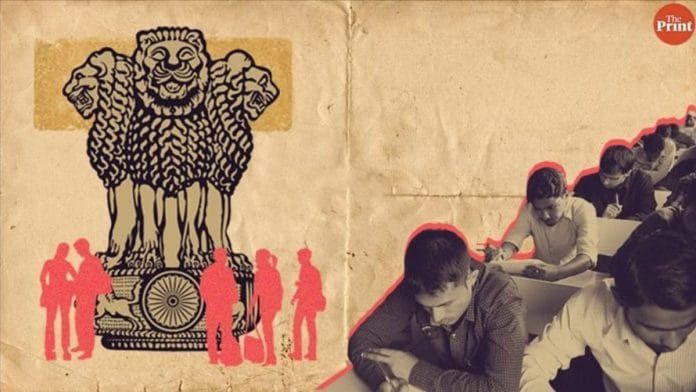New Delhi: Sixteen years after he began his struggle to get a rightful place in the civil services, 44-year-old Pankaj Srivastava, who is 100 percent visually impaired, is finally set to begin his job as an information service officer Friday. Currently working with the State Bank of India (SBI) in Lucknow, Srivastava’s appointment was finalised last week.
Srivastava was among a number of disabled candidates who cleared the Civil Services Examination but were not appointed because the disability reservations law had not been put into effect. It took a years-long legal battle to finally have his appointment finalised.
Despite a Supreme Court judgment in July this year, which directed the Centre to employ Srivastava in the reserved category for the disabled, his appointment did not come easy.
On 19 December, he received a letter from the Department of Personnel and Training (DoPT) informing him about his posting in the Indian Information Services (IIS), though his scores made him eligible for a space even in the Indian Revenue Services (IRS).
It came after the Supreme Court warned the DoPT secretary of contempt of action for not complying with its July directive.
Speaking to ThePrint Tuesday, Srivastava said he has no regrets about not getting an IRS job. “The court has protected my salary and that is good for me. I have a job that I aspired for,” he said, adding that he looked forward to joining his new service.
Also Read: SC grants inheritance rights to ST women via 1875 law, urges Centre to amend their succession laws
SC warns of contempt proceedings
Srivastava’s advocate, Rajneesh Kumar Jha, told ThePrint that, according to the July judgment, his client should have been allocated the appropriate cadre, given his disability, by October end. However, on 15 October the government filed an application, seeking an extension of the deadline by 12 weeks.
The three-page application did not state specific reasons, asking for more time to implement the court’s judgment. It simply said the DoPT was in consultation with the Union Public Service Commission, which conducts the exam, and other stakeholders and that Srivastava’s medical examination was yet to be completed before he was considered for allocation of appropriate service.
Later, on 6 December, the DoPT filed a detailed affidavit underlining the steps it had taken to comply with the SC order on Srivastava’s appointment. This document disclosed that DoPT had received comments from all stakeholders by the end of August 2024, following which it sought advice from the Department of Legal Affairs which was received by the end of September.
The affidavit informed that after deliberations and consultations with all stakeholders, it was decided that Srivastava would be allocated either Indian Information Services or Armed Forces Headquarters Civil Services (AFHQCS).
But when the matter was heard on 9 December, the Supreme Court bench, led by Justice Abhay S. Oka, which had delivered the July judgment, reproached the government for its complacency. On perusing the 6 December affidavit of DoPT, the bench observed, “there is hardly any compliance made by Union of India” with the court’s judgment.
In a sternly worded order, the bench ordered the secretary of DoPT to file a personal affidavit showcasing why “action under the Contempt of Courts Act, 1971” should not be initiated against him. The last date for filing this affidavit was 19 December, with the court fixing 20 December as the next date of hearing.
With the DoPT secretary facing contempt notice, the department issued Srivastava’s appointment letter on 18 December, which was served to him a day later. A compliance affidavit was simultaneously filed before the SC on 19 December, urging the court to drop the contempt proceedings against the DoPT secretary.
During the hearing on 20 December, Solicitor General Tushar Mehta informed the court about Srivastava’s appointment. He also confirmed to the bench that Srivastava’s pay structure would be similar to the one that his batchmates are drawing now, though, as clarified in the July judgment he will not receive any dues or promotions that his colleagues have got.
The July judgment
On 8 July, 2024, the top court invoked its extraordinary power under Article 142 to direct the Union government to give an appointment to Srivastava and 10 other such persons either in the IRS or in another service or branch against the backlog in reserved vacancies.
The court had pulled up the Centre for its failure to implement the law on disability reservation and for making the candidates run from pillar to post, despite having cleared the Civil Services Examination.
Srivastava cleared the Civil Services Examination in 2008 and had given four preferences for services Indian Administrative Services (IAS), Indian Revenue Services-Income Tax (IRS-IT), Indian Railway Personnel Service (IRPS), and Indian Revenue Service (Customs and Excise) (IRS-C&E).
However, since the government had not given effect to the reservation policy under the Persons with Disabilities Act of 1995, Srivastava and similarly placed candidates were not appointed. Srivastava, however, challenged his non-appointment to the vacancies for people with disabilities that remained unfilled between 1996 and 2009.
In 2012 the Central Administrative Tribunal ruled in his favour. The ruling was challenged by the Centre before the Delhi High Court, which upheld Srivastava’s case in 2013. The Centre then took the challenge to the Supreme Court, which, with its July judgment, ended Srivastava’s struggle after 11 years.
The SC judgment also brought relief to 10 other candidates who, like Srivastava, were not accommodated despite clearing the exams. According to the Centre’s latest affidavit, five of the 10 candidates have also been appointed to the IIS.
(Edited by Sanya Mathur)






